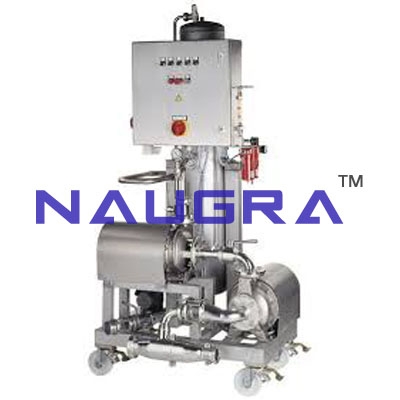- Civil Lab Mechanical Lab Engineering Lab Equipments
- sales@didacticlabequipments.com

CAT NO: DIDACTICNLE-Export-206009
Separation In Sedimentation Tanks- Engineering Lab Training Systems.
Technical Description
In sedimentation tanks,
solids are separated out of suspensions under the influence of gravity.
For this, the density of the solid particles must be greater than that
of the liquid.
The factors influencing the separation process in
sedimentation tanks can be investigated. First a suspension of water and
whiting is prepared in a tank. A pump delivers the suspension to the
sedimentation tank. In the inlet area of the sedimentation tank the
suspension intermingles with fresh water. The mixture flows over an
inlet weir. On their way through the sedimentation tank the solids sink
to the bottom. The clarified water flows out by way of the weir at the
tank outlet.
The solid concentrations at the tank inlet and
outlet are determined by means of two Imhoff hoppers. The mass separated
in the tank can be determined from the difference between them. The
flow rates of the suspension and the fresh water are adjusted by valves
and indicated by flow meters. This enables the mixing ratio - and thus
the solid concentration of the mixture - to be adjusted. In order to
ensure a uniform mix of the suspension and prevent premature
sedimentation, a portion of the suspension is fed back into the tank by
way of a bypass. To investigate the flow conditions, ink can be added
with a piston burette to the fresh water stream as a tracer substance.
The mixed-in volume of ink is entered using keys and indicated on a
display. To provide enhanced observation of the flow conditions and
settling processes, the sedimentation tank is made of transparent
material.
A baffle plate can be positioned in the tank to impede
the flow. Its horizontal and vertical positioning in the tank is
adjustable. This enables the flow conditions and the efficacy of the
separation process to be influenced.
The well-structured instructional material sets out the fundamentals and
provides a step-by-step guide through the
experiments.
Fluid Mechanics Lab Equipments manufacturers
